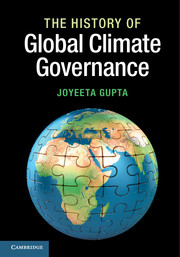Book contents
- Frontmatter
- Dedication
- Contents
- Foreword
- Preface and acknowledgements
- List of abbreviations
- Part 1 Introduction
- Part 2 The history of the negotiations
- 3 Setting the stage
- 4 Institutionalizing key issues
- 5 Progress despite challenges
- 6 The regime under challenge
- 7 Enlarging the negotiating pie (2008–2012)
- Part 3 Issues in global climate governance
- Part 4 Towards the future
- References
- Index
7 - Enlarging the negotiating pie (2008–2012)
from Part 2 - The history of the negotiations
Published online by Cambridge University Press: 05 February 2014
- Frontmatter
- Dedication
- Contents
- Foreword
- Preface and acknowledgements
- List of abbreviations
- Part 1 Introduction
- Part 2 The history of the negotiations
- 3 Setting the stage
- 4 Institutionalizing key issues
- 5 Progress despite challenges
- 6 The regime under challenge
- 7 Enlarging the negotiating pie (2008–2012)
- Part 3 Issues in global climate governance
- Part 4 Towards the future
- References
- Index
Summary
Introduction
The previous period had ended with IPCC (2007: 30) arguing that: ‘warming of the climate system is unequivocal’, and with IPCC and Al Gore winning the Nobel Peace Prize. Several high-level global climate meetings were held including those at the UN Security Council and the G8 summits. With US President Barack Obama coming to office there was an expectation that climate change was going to be given serious attention.
However, this was also the beginning of an explosion of climate scepticism. Furthermore, by 2008, the global recession was setting in – affecting the developed countries while the large developing countries appeared to have booming economies. China, South Africa, Brazil and India were becoming richer. The international dynamics were changing. The question was whether the developing countries would follow the developed countries into their spiralling recession and thereby have significantly lower emission increases, or whether they would remain relatively unhurt.
The chronology of events
In the run up to 2008, there was a housing crisis (prices first went up and then fell) followed by a financial crisis in the USA. This spilled over to Europe spurred by investments in subprime mortgages in the USA, collapsing banks and lenders (UK Northern Rock, US Bear Stearns, Lehman Brothers, Fannie Mae and Freddie Mac), leading to financial problems in other banks and the start of a recession with falling growth rates in many countries. Some countries began to recover, but Greece, Iceland, Ireland, Portugal and Spain continue to face problems. The European Central Bank adopted several measures. Recovery has slowed down in most developed countries. The developing countries appeared to be growing but exports will probably fall as the recession continues.
- Type
- Chapter
- Information
- The History of Global Climate Governance , pp. 123 - 144Publisher: Cambridge University PressPrint publication year: 2014



